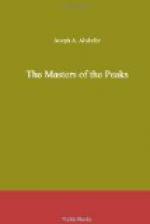“The intermediary of whom you know, the bearer of this letter, has brought me word from you that the English Colonial troops, after the unfortunate battle at Lake George, have not pushed their victory. He also informs us that the governors of the English colonies do not agree, and that there is much ill feeling among the different Colonial forces. He says that Johnson still suffering from his wound, does not move, and that the spirit has gone out of our enemies. All of which is welcome news to us at this juncture, since it has given to us the time that we need.
“Our defeat but incites us to greater efforts. The Indian tribes who have cast their lot with us are loyal to our arms. All the forces of France and New France are being assembled to crush our foes. We have lost Dieskau, but a great soldier, Louis Joseph de Saint Veran, the Marquis de Montcalm-Gozon, is coming from France to lead our armies. He will be assisted by the incomparable chieftains, the Chevalier de Levis, the Chevalier Bourlamaque and others who understand the warfare of the wilderness. Even now we are preparing to move with a great power on Albany and we may surprise the town.
“Tell those of whom you know in Albany and New York to be ready with rifles and ammunition and other presents for the Indian warriors. Much depends upon their skill and promptness in delivering these valuable goods to the tribes. It seals them to our standard. They can be landed at the places of which we know, and then be carried swiftly across the wilderness. But I bid you once more to exercise exceeding caution. Let no name of those associated with us ever be entrusted to writing, as a single slip might bring our whole fabric crashing to the ground, and send to death those who serve us. After you have perused this letter destroy it. Do not tear it in pieces and throw them away but burn it to the last and least little fragment. In conclusion I say yet again, caution, caution, caution.
Raymond Louis de St. Luc.”
The three looked at one another. Garay was in the third course of his breakfast, and no longer took notice of anything else.
“Those associated with us in Albany and New York,” quoted Willet. “Now I wonder who they are. I might make a shrewd guess at one, but no names are given and as we have no proof we must keep silent about him for the present. Yet this paper is of vast importance and it must be put in hands that know how to value it.”
“Then the hands must be those of Colonel William Johnson,” said Robert.
“I fancy you’re right, lad. Yet ’tis hard just now to decide upon the wisest policy.”
“The colonel is the real leader of our forces,” persisted the lad. “It’s to him that we must go.”
“It looks so, Robert, but for a few days we’ve got to consider ourselves. Now that we have his letter I wish we didn’t have Garay.”
“You wouldn’t really have starved him, would you, Dave? Somehow it seemed pretty hard.”




